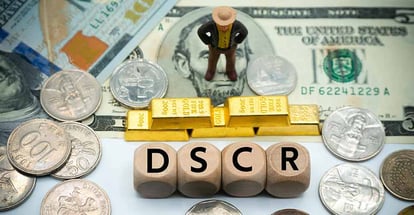Can You Get No Down Payment DSCR Loan in Florida?
Are you considering purchasing a property in Florida but don't have the funds for a down payment? DSCR loans may be an option worth exploring.
In this blog post, we will discuss the requirements for down payments on DSCR loans, whether no down payment options are available in Florida, and the benefits and considerations of such loans.
We'll also explore alternative financing options if a no-down-payment loan is not feasible for you. Let's dive in!
Table of Contents
Availability of No Down Payment DSCR Loans in Florida
As of September 2023, changes in lending regulations have occurred, impacting certain loan options in Florida.
0 down payment DSCR (Debt Service Coverage Ratio) loan options within the state are no longer available. The minimum down payment to get a DSCR loan in Florida is generally 20% - 25%.
This means borrowers can no longer access these specific loan offerings with no initial down payment. Those interested in acquiring loans should explore alternative financial products available in Florida.

What is a DSCR Loan?
A DSCR (Debt Service Coverage Ratio) loan is a type of financing commonly used in real estate investing, where the borrower's ability to repay the debt is assessed based on their property's cash flow.
Rather than focusing solely on credit scores or down payments, lenders consider the property's income potential and calculate its DSCR ratio.
The DSCR ratio measures how much net operating income a property generates compared to its debt obligations.
Lenders typically require a minimum DSCR ratio of 1.25 or higher to ensure that there is enough cash flow to cover mortgage payments and other expenses.
To calculate this ratio, divide the property's net operating income by the total debt service payment.
One key benefit of obtaining a DSCR loan is that it allows borrowers with limited funds for down payment to still qualify for financing.
Since lenders primarily evaluate the property's cash flow rather than relying solely on personal financials, individuals who may not meet traditional lending criteria can have an opportunity to secure financing for investment properties through these loans.
Additionally, by considering rental income when assessing repayment capacity, investors can potentially leverage their investments and expand their real estate portfolio without needing substantial upfront capital requirements.
Do I Have to Put Down 20% for a DSCR Loan?
Debt Service Coverage Ratio (DSCR) loans have become an appealing option for many investors, primarily due to their focus on a property's potential cash flow rather than the borrower's personal income.
However, as with any financial product, there are various factors and requirements to consider. One of the frequently asked questions about DSCR loans pertains to the amount of down payment necessary.
As of September 2023, here's what prospective borrowers need to know about the down payment criteria for DSCR loans.
The down payment for a DSCR loan, for many lenders, often hovers around the 20% mark.
This means that if you're looking to secure a DSCR loan, you should anticipate needing to provide at least a fifth of the property's purchase price upfront. The rationale behind this significant down payment is rooted in risk management.
By requiring a substantial initial investment, lenders believe that borrowers will be more committed to the financial responsibility of the loan, thereby reducing the lender's risk exposure.
Compared to some conventional mortgages, a 20% down payment might seem steep.
Traditional residential mortgages sometimes offer options with lower down payments, especially for first-time homebuyers or those who qualify for specific government-backed programs.
However, it's essential to remember that DSCR loans cater primarily to investors, not typical residential buyers.
The nature of these loans, focusing on property income potential rather than personal income, inherently carries a different risk profile, which informs the down payment requirement.
Beyond the down payment, another notable characteristic of DSCR loans is their typically higher interest rates. But why are these rates elevated?
The answer lies in the perceived risk from the lender's perspective. DSCR loans prioritize the income generated from the property over the borrower's personal financial standing.
While this can be advantageous for those with fluctuating personal incomes but stable property revenues, it also means that lenders are placing a lot of trust in the property's earning potential.
If the property doesn't generate the expected income, or if there are unforeseen complications like prolonged vacancies or unexpected maintenance costs, the borrower might struggle with repayment.
Recognizing these potential challenges, lenders often charge higher interest rates for DSCR loans as a protective measure against the increased risk.
It's a way for financial institutions to compensate for potential uncertainties and ensure they remain profitable even if some loans default.
As of September 2023, if you're considering a DSCR loan in Florida or elsewhere, it's essential to be prepared for a substantial down payment, often around 20%.
This upfront cost ensures that both the borrower and lender share in the property's investment, promoting a more balanced risk distribution.
Additionally, while the allure of focusing on a property's income potential is strong, borrowers should brace for higher interest rates that reflect the unique risks associated with DSCR loans.
DSCR Loan Requirements
When considering a DSCR (Debt Service Coverage Ratio) loan, there are specific criteria that borrowers must meet to qualify.
Firstly, a credit score of 620 or higher is typically necessary, although this can vary depending on the lender and other unique circumstances. This requirement is akin to what's needed for most conventional investment property loans.
Secondly, a down payment ranging from 20% to 25% is essential for obtaining a DSCR loan for any investment property.
Further, the lending institution will request both a property appraisal and a rent schedule. For single-family homes, the Form 1007 rent schedule is utilized to gauge the property's value and its potential market rent.
In contrast, properties with two to four units will require a Form 1025, designed for small residential income property appraisal reports.
Finally, a crucial metric for approval is the DSCR ratio itself. Borrowers should aim for a ratio of 1 or above. While some lenders might consider a DSCR below 1, it usually results in a more substantial down payment and elevated interest rates.
To streamline the process and assess the viability of an investment property, prospective borrowers can use a DSCR calculator to ensure they're financially positioned to handle their debt obligations.
Benefits and Considerations of No Down Payment DSCR Loans
No down payment DSCR loans offer several advantages to borrowers. One primary benefit is the increased cash flow.
By not requiring a down payment, borrowers can allocate their funds to other investments or expenses, thus enhancing their liquidity.
Furthermore, this type of financing becomes more accessible to individuals who might not possess ample savings or liquidity to meet conventional down payment prerequisites.
This ease of accessibility potentially allows borrowers to enjoy lower upfront costs, increasing their purchasing power.
In the case of investors, the use of DSCR loans could lead to positive cash flow from rental incomes, covering both loan repayments and other related expenses.
While no down payment DSCR loans present certain advantages, they also come with inherent considerations. A notable concern is the higher interest rates associated with these loans.
To counterbalance the increased risk of lending without a down payment, lenders frequently impose elevated interest rates. This practice amplifies the overall cost of borrowing for the individual.
Another consideration is the potential for negative equity.
In the absence of a down payment, a decline in housing prices might result in borrowers owing more than the actual worth of their property.
Additionally, prospective borrowers must be aware of the strict eligibility criteria. Aspects such as creditworthiness, stable income, and property evaluation play crucial roles in the approval process.
The limited availability of these loan options in certain regions, including Florida, further complicates matters, as not all lenders extend no down payment options for DSCR loans.
How to Apply for a DSCR Loan in Florida: Step-by-Step
Start by identifying banks, credit unions, and private lenders in Florida that offer DSCR (Debt Service Coverage Ratio) loans like MakeFloridaYourHome.
Given the specialized nature of DSCR loans, not all financial institutions will provide this option. Online research, reviews, and recommendations from real estate professionals can be invaluable during this phase.
Understand Eligibility Criteria
Before applying, familiarize yourself with the general eligibility requirements for DSCR loans.
Typically, lenders will evaluate factors such as property type, potential rental income, and the borrower's financial history.
Knowing these criteria beforehand can help streamline the application process.
Gather Necessary Documentation
Most lenders will require documents like property appraisals, rental income projections, personal financial statements, and credit reports.
Collate all essential paperwork in advance to ensure a smooth submission process. Ensuring accuracy and completeness in your documentation is vital to avoid unnecessary delays.
Complete Loan Application
Fill out the loan application form provided by your chosen lender.
The form will typically ask for details about the property, your personal and financial information, and your plans for the property's rental income.
Take your time to fill out the application accurately, double-checking all details before submission.
Await Property Evaluation
After submitting your application, lenders usually conduct a property evaluation or appraisal.
This step ensures that the property's value and potential rental income align with the loan amount you're requesting.
The evaluation will assess the property's condition, location, and market demand.
Review Loan Terms
If your application is approved, the lender will provide you with the terms of the loan, including interest rates, monthly payments, and loan duration.
Carefully review these terms, ensuring you understand all obligations and potential fees associated with the DSCR loan.
Consult with Financial Advisor
Given the unique nature of DSCR loans, it's advisable to consult with a financial advisor or a real estate finance expert.
They can provide insights into the loan's structure, potential risks, and benefits, ensuring you make an informed decision.
Finalize and Close the Loan
Once you're satisfied with the loan terms and have consulted with professionals, proceed to finalize the loan.
This step involves signing loan agreements, setting up monthly payments, and fulfilling any other lender-specific requirements.
Upon successful completion, the loan funds will be disbursed, and you can utilize them as intended.
Florida DSCR Loan Refinancing
In Florida, DSCR loan refinancing offers property owners an avenue to substitute their current loan with a newer one, often having better terms.
The emphasis here is on the Debt Service Coverage Ratio (DSCR)—a metric analyzing a property's potential to yield enough income to manage its debt obligations.
Florida-based lenders, during a DSCR loan refinance, evaluate the ongoing cash flow from the property and deduce the revised DSCR based on the new loan conditions.
Properties in Florida exhibiting a robust revenue stream that aligns with the lender's DSCR stipulations could be eligible for refinancing advantages, possibly including a decreased interest rate or extended loan tenure.
Cash-Out Refinancing in Florida's DSCR Loans
Florida offers a distinctive DSCR loan refinancing variant known as cash-out refinancing. This permits property owners to tap into their property's equity, securing cash upon closing the deal.
Beyond merely substituting the old loan, Floridians can potentially procure funds surpassing their prevailing mortgage amount, contingent on the property's equity and the lender's specifications.
For many in Florida, this method is appealing, especially when looking to capitalize on property equity for diverse needs, be it property upgrades, debt consolidation, or other investment endeavors.
Conclusion
When considering purchasing a property in Florida, it's important to explore all financing options available. No down payment options can provide a pathway to homeownership or real estate investment without the immediate financial burden.
However, it is crucial to carefully evaluate the considerations for obtaining a no down payment DSCR loan and ensure that your income and creditworthiness meet the necessary criteria.
Additionally, exploring alternative financing options can provide flexibility and potentially better terms suited to your specific circumstances.
By thoroughly researching and understanding these options, prospective homebuyers or real estate investors can make informed decisions about securing the right financing for their objectives.
With over 50 years of mortgage industry experience, we are here to help you achieve the American dream of owning a home. We strive to provide the best education before, during, and after you buy a home. Our advice is based on experience with Phil Ganz and Team closing over One billion dollars and helping countless families.

About Author - Phil Ganz
Phil Ganz has over 20+ years of experience in the residential financing space. With over a billion dollars of funded loans, Phil helps homebuyers configure the perfect mortgage plan. Whether it's your first home, a complex multiple-property purchase, or anything in between, Phil has the experience to help you achieve your goals.


 By
By  Edited by
Edited by 





